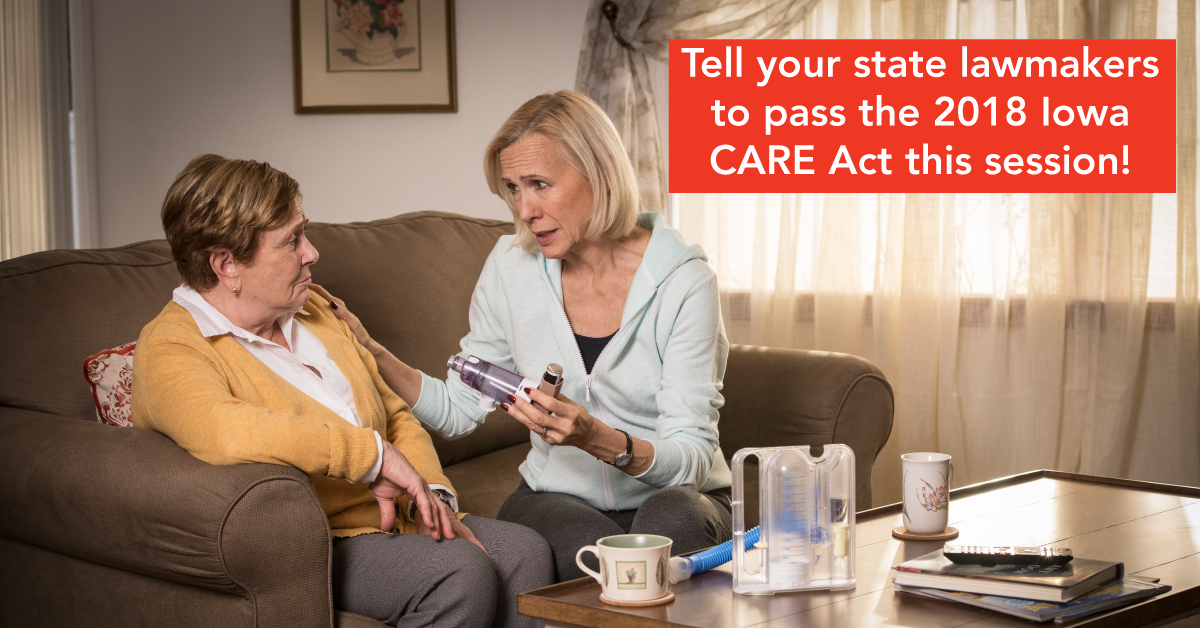AARP Hearing Center

As state lawmakers near a key deadline, the 2018 legislative session’s first funnel of February 16, AARP Iowa is urging lawmakers to pass the 2018 Iowa CARE (Caregiver Advise, Record, Enable) Act. The bill (SSB 3123), with no cost to the state or taxpayers, would provide vital support for Iowa’s more than 317,000 family caregivers who help their older parents, spouses and other loved ones live safely and independently at home.
The 2018 Iowa CARE Act includes three commonsense steps that will help family caregivers when their loved ones go into the hospital and as they transition home. It requires that: a family caregiver’s name be recorded when their loved one is admitted to a hospital; the caregiver be informed when their loved one is to be moved or discharged; and, the caregiver is provided instruction of the medical tasks they will need to perform at home.
A 2015 AARP Iowa survey of 1,000 Iowa voters age 45+ found that two-thirds (65 percent) of Iowa family caregivers assist their loved ones with complex medical tasks such as wound care and IVs and injections, yet 50 percent of current or past caregivers claim they did not receive instruction for the medical tasks they would be performing at home.
“Right now, family caregivers across Iowa are performing medical and nursing tasks for their loved ones; most have no training,” said Kent Sovern, state director of AARP Iowa, which serves over 370,000 members 50 and older in Iowa. “More disturbing, half of all family caregivers whose loved ones were hospitalized did not receive instruction on medical tasks before discharge. We can fix this.”
Iowa is one of only 14 states that do not have a law similar to the 2018 Iowa CARE Act in place for caregiving families. No federal laws, rules or regulations—including those for Medicare—define the steps hospitals must take so family caregivers are engaged in their loved ones’ care.
Survey results also showed that the vast majority of Iowa’s registered voters 45 and older support the CARE Act, including Sue Olson of Ames, who received no notification from the hospital about her mother’s discharge following aortic aneurysm surgery, and little information about her care needs.
“It was just totally overwhelming and intimidating because I had no instructions about how I’m going to care for her wound; how am I going to manage my mom’s medications; how am I going to get her out of bed,” said Olson. “It didn’t have to be this way.”
Across Iowa, family caregivers spend 295 million hours each year caring for loved ones—a contribution totaling about $3.8 billion in unpaid care. They carry out tasks like managing finances, providing transportation, helping with bathing and dressing, cooking meals and more.
“Family caregiving is very rewarding, but it can also be exhausting, overwhelming, and stressful,” added Sovern. “The 2018 Iowa CARE Act is a modest, commonsense bill to help make these big responsibilities a little bit easier.” According to Sovern, AARP Iowa has mounted a grassroots campaign to push the 2018 Iowa CARE Act, and the organization’s Iowa members have been contacting state lawmakers in favor of the bill.
AARP activists will visit the State Capitol for the Association’s annual Iowa Lobby Day, Wednesday, February 14, to discuss the CARE Act and other legislative issues with their elected officials. A press conference will take place at 8:45 a.m., in the Capitol’s rotunda area.
More information on the 2018 Iowa CARE Act can be found at www.aarp.org/IAcareact2018 or www.aarp.org/ia.































































